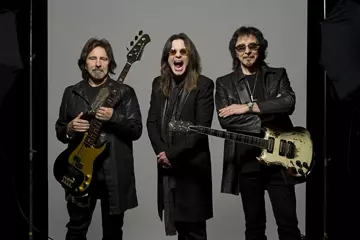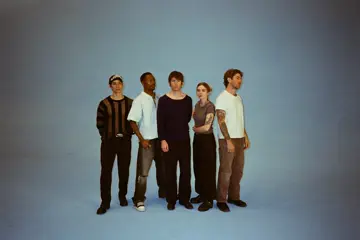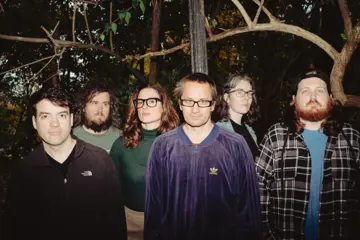The opening song on the self-titled debut album for Bedouine is called Nice And Quiet. It's fitting, given that Bedouine's music suits the descriptive, as does its maker. Azniv Korkejian, the 33 year old behind its name, is softly spoken and someone who, as a listener, sticks to "quiet and intimate" records. "I really like quiet music, and being calm," she says. "I don't really like getting amped-up too much. I like doing quiet things in quiet spaces. I don't like crowds. I think I'm really sensitive to loud sound."
The songs throughout the Bedouine LP - which matches Korkejian's gentle voice and fingerpicking to sweet string parts, a vintage, almost classic air persisting all the while - are filled with things that suggest this personality. As on Solitary Daughter, when Korkejian sings, "Leave me alone to the books and the radio snow," and, "I'm calm by my lonesome/I feel right at home".
Growing up, Korkejian loved spending time by herself, but she wasn't a shy, bookish child. Born in Syria to Armenian parents, they moved to the American district in Saudi Arabia when she was an infant. There, her older brothers ("who were pretty athletic") got obsessed with basketball, a passion that Korkejian, a self-confessed "tomboy", soon picked up. Her family emigrated to the USA when she was ten and, thereafter, in her teenage years, she was "bratty".
Korkejian always wrote songs, but "for the longest time" she had a sensible Los Angeleno career goal in mind, as a sound editor. That's what she studied and pursued; starting out doing dialogue editing for "unscripted television" (her IMDb page is full of reality-TV trash like Catfish: The TV Show, Barter Kings and Preachers' Daughters), before graduating to music editing with Michael Showalter's acclaimed The Big Sick this year. By the time the film came out, however, Korkejian had taken leave of her career, throwing herself into music with the release of her debut LP.
Don't miss a beat with our FREE daily newsletter
The result has been a year of endless touring, opening for people like Jose Gonzalez and Fleet Foxes; quite a change after Korkejian had never played back-to-back nights in her life before. Sometimes, Bedouine would take to the stage with only her acoustic guitar, meaning that her "nice and quiet" songs were particularly quiet. She learnt to take her calm demeanour on stage with her, though.
In making the Bedouine LP, Korkejian's goal had only been for "it to be substantial". Her familiarity with software rarely played into any of the album's sounds; save for on Summer Cold, where she created a "sonic landscape" of sound design in which the song nestled. While her familiarity with software meant she "was able to step into the hot-seat", to sweep through sessions or EQ things, she sees that kind of approach existing in opposition to her music. "Technology really doesn't have anything to do with the music," she says. "I'm not at a computer when I make anything. I don't think of production, at all; I'm just sitting down with a guitar, by myself."
This shows in the way the album was recorded: on vintage, reel-to-reel analogue tape. "I knew I wanted it to be on tape, that I wanted it to have a lot of space. I wanted the space to have a quality of its own. I really wanted a warm, rich sound," Korkejian says.
To achieve that, she worked with noted analogue enthusiast Gus Seyffert, who's worked with Beck, Spain and Norah Jones. "He instinctively knew what I wanted, which was key," offers Korkejian. "[Because it] is hard to articulate, it's just a feeling. If something sounds too clean and doesn't have much character, I'm not drawn to it in the same way. I don't think you have to record on tape for something to be good, but, for me, it makes a huge difference. Not only in the finished result, but in the process, too. I'd much rather record one take on tape and think of it as a singular, unbroken performance rather than just think of it as a soundwave ready for editing down on the back-end."















